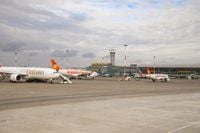On May 7, 2025, significant air travel disruptions occurred in Tatarstan as Rosaviatsiya, the Russian aviation authority, reported the temporary closure of Kazan International Airport and Begishevo Airport. The closures were implemented to ensure flight safety amid a heightened threat of drone attacks. This situation arose after a regime of "drone danger" was declared in Tatarstan, reflecting increasing concerns over aerial security in the region.
At 4:35 a.m. on the same day, Rosaviatsiya announced that restrictions on the arrival and departure of aircraft at Kazan International Airport would be in effect. This decision followed a series of closures that had already impacted both republican airports the previous day. The Ministry of Emergency Situations (MChS) had issued warnings to residents and visitors in Tatarstan about the potential for drone attacks, emphasizing the seriousness of the threat.
In the wake of these restrictions, numerous flights were delayed or canceled. Reports indicated that flights from Kazan to various destinations, including Astrakhan, Antalya, Volgograd, Moscow, Perm, Istanbul, Tashkent, and Sharm el-Sheikh, faced significant delays. The Tatar Transport Prosecutor's Office stepped in to monitor compliance with passenger rights during this tumultuous period, ensuring that affected travelers received the necessary support.
Passengers were advised to check with airlines for updates, as many were left stranded due to the sudden changes. Some airlines, including Aeroflot, rerouted their planes to alternate airports, and rescheduled several flights connecting Moscow, Norilsk, Krasnoyarsk, and Kurgan. In a statement, NordStar, another airline, recommended that passengers rely on official information from airlines and airports regarding their flight statuses.
The situation drew frustration from travelers. One passenger tweeted about being stuck on a plane at Pulkovo Airport for over five hours, recounting that the aircraft was filled with small children and they were not allowed to disembark. Another traveler shared their experience in Domodedovo Airport, where people were reportedly sleeping on the floor due to the prolonged delays.
As the morning progressed, the air travel situation began to stabilize. By 10:50 a.m., Rosaviatsiya announced that the restrictions at Kazan and Begishevo airports were lifted. The aviation authority confirmed that the closures were enacted purely for safety reasons, and operations could resume. However, the impact of the previous closures lingered, as delays and cancellations continued to affect numerous flights.
In addition to the immediate disruptions, the broader implications of these events raised questions about air travel security in Russia. The recent drone threats have heightened awareness of aerial vulnerabilities, prompting authorities to take preventive measures. On the night of May 6, 2025, both Kazan and Nizhnekamsk airports were closed for several hours due to the drone threat, marking a significant escalation in security protocols.
As the Tatarstan region navigates these challenges, the response from local authorities has been swift. The Ministry of Emergency Situations has been proactive in communicating potential risks to the public, a move that reflects an increased emphasis on safety amid rising concerns about drone activities. Reports indicate that the drone threat regime was in effect for nearly five hours, during which both airports remained closed.
The Tatar Transport Prosecutor's Office is expected to continue monitoring the situation closely. They have established a mobile reception for passengers affected by the disruptions, providing a point of contact for those seeking assistance. Passengers have been encouraged to report any violations of their rights to the on-duty prosecutor of the Volga Transport Prosecutor's Office.
As the dust settles from this series of events, the aviation community in Tatarstan faces the ongoing challenge of ensuring safety while maintaining operational efficiency. The recent closures serve as a reminder of the delicate balance between security measures and the need for uninterrupted air travel.
In conclusion, the events of May 7, 2025, highlight the complexities of managing air travel in an era where security threats are evolving. Authorities must remain vigilant and responsive to emerging risks, as the safety of passengers and the integrity of air travel systems depend on their ability to adapt to these challenges.

